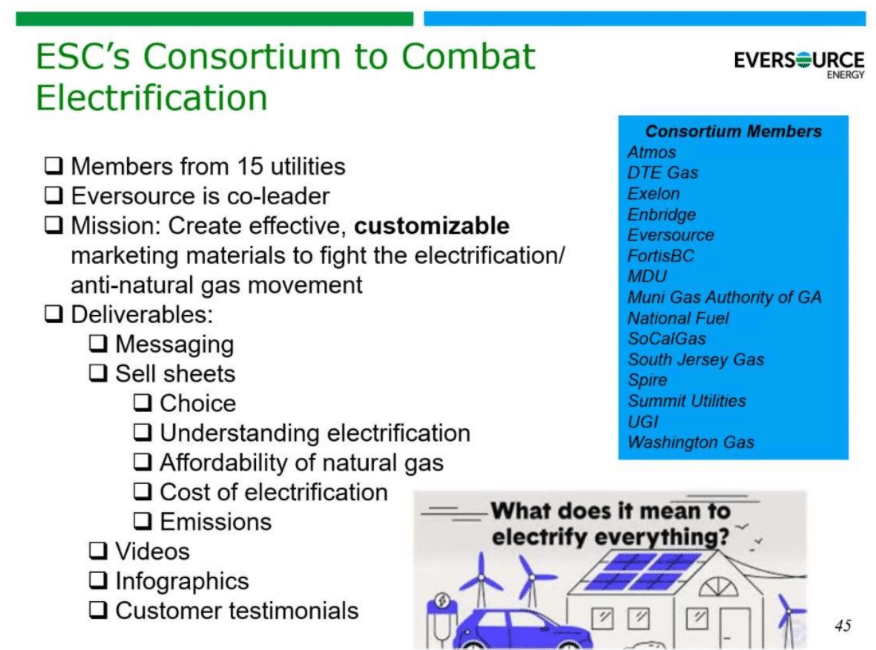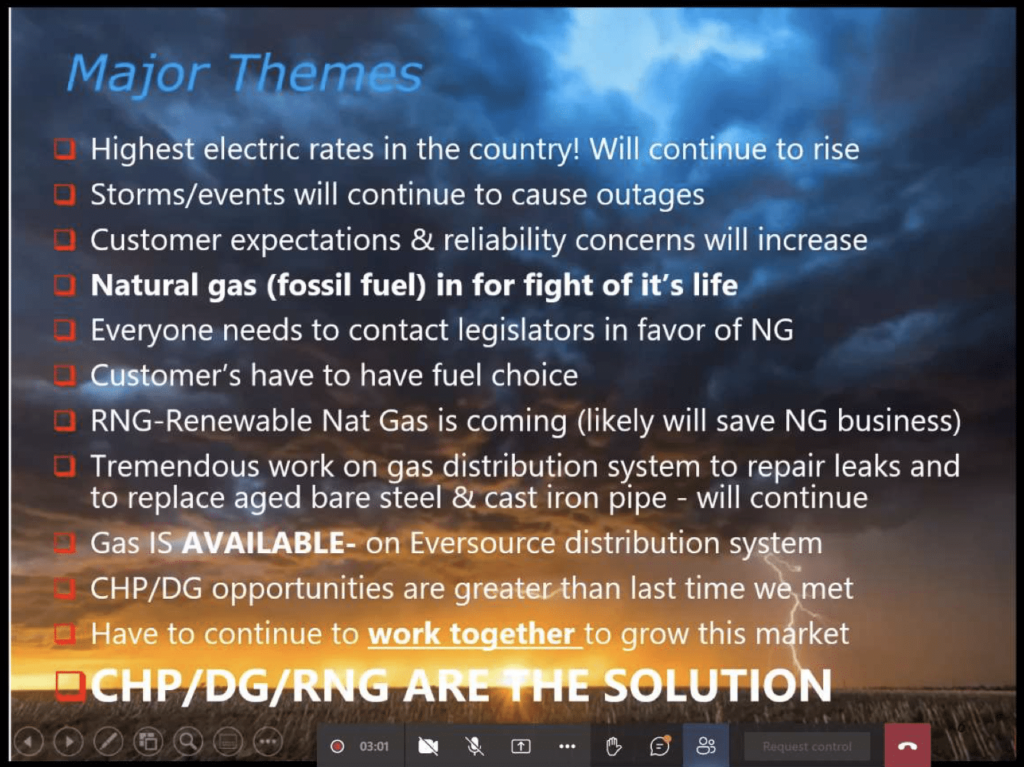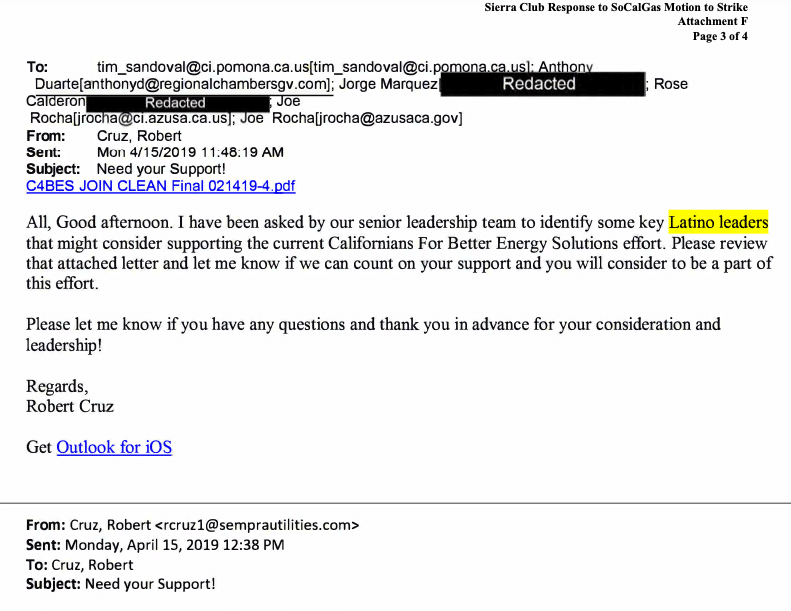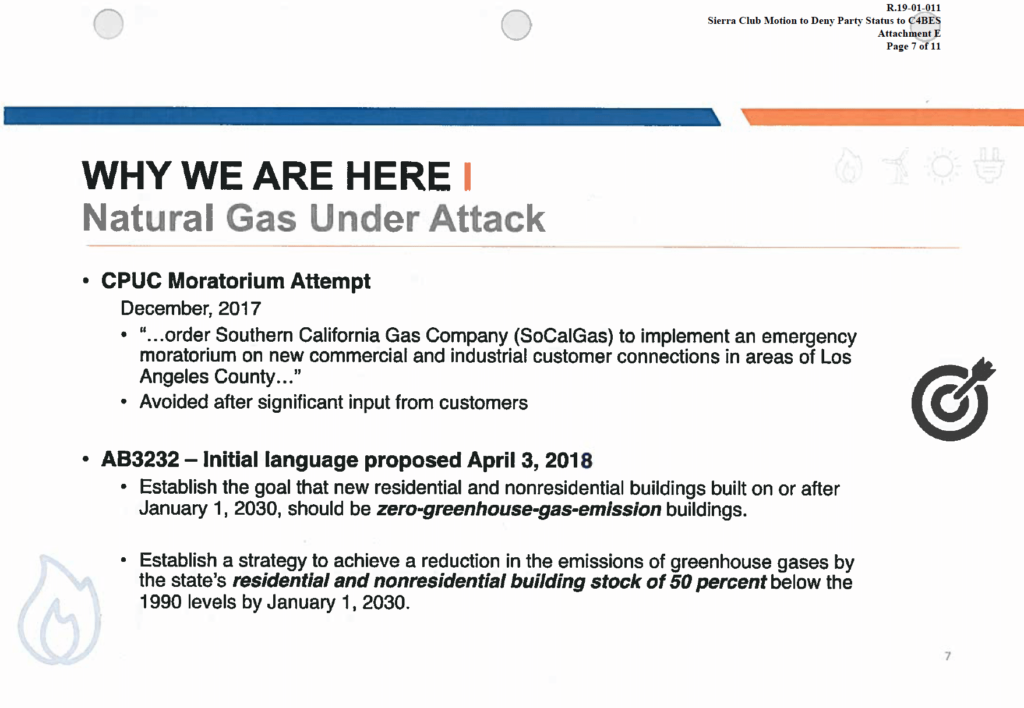Internal documents detail how gas utilities greenwash RNG and hydrogen

Internal American Gas Association (AGA) meeting notes from March 2018 reveal that the industry planned to use RNG advocacy as part of a strategy to “mitigate” stakeholder opposition, specifically from environmental groups. Following a presentation by National Grid on how it dealt with opposition to a gas pipeline expansion in the northeast, AGA devised an action item for its members to “consider how technologies to decarbonize the pipeline can serve as a conduit to environmental organizations, thereby seeking to mitigate the opposition’s fervor against infrastructure expansion.”
In 2020, AGA reported over $30.2 million in revenue, of which $28 million was explicitly from utility membership dues, according to the trade association’s tax filings. Utilities pass these fees on to their customers to pay each month through their gas bills. For example, National Grid’s Massachusetts subsidiaries, Boston Gas Company and Colonial Gas Company, together have paid over $300,000 a year to AGA. AGA has used this revenue to lead efforts to pass state-level bills to block local action to cut greenhouse gas emissions.
During another industry meeting, Eversource told the assembled utilities that gas is “in for fight of it’s life” [sic] and that RNG will “likely save” the gas business. A “call to action” slide framed several questions for the utilities to discuss, including: “how can we make sure we reach decision makers” and “take advantage of power outage fear.”


The meeting was hosted by a consortium within the Energy Solutions Center, which is a nonprofit housed in the office of the American Gas Association. Members of the Energy Solutions Center include: Atmos, DTE Gas, Exelon, Enbridge, MDU, National Fuel, SoCalGas, South Jersey Gas, Spire, Summit, UGI, and Washington Gas.
While Eversource said it left the secretive “Consortium to Combat Electrification” group in 2021, it had been paying a membership fee to Energy Solutions Center and recovering the costs from its customers. Eversource’s Connecticut subsidiary Yankee Gas paid Energy Solutions Center $36,971 in 2020, according to operation and maintenance work-pages on file with the Public Utilities Regulatory Authority.
Southern California Gas Company, a Sempra subsidiary, funded an organization called Californians for Balanced Energy Solutions (C4BES) to promote the continued investment and use of the gas system to local communities and governments. Documents detailed how SoCalGas targeted “key Latino leaders” to support C4BES and push the idea of “renewable” gas as an alternative to reducing emissions.

A PowerPoint presentation made in February to the group’s board, a copy of which was obtained by The Los Angeles Times, lists one of the group’s goals as “Communicate the role of both natural gas and renewable gas in protecting the environment.” Several slides describe government initiatives that could limit the use of gas under the heading, “Why We Are Here: Natural Gas Under Attack.” Metadata showed the PowerPoint was created by Ken Chawkins, a public policy manager at SoCalGas.

Furthermore, Mark Krebs of Spire, a gas utility that serves customers in Alabama, Mississippi and Missouri, emailed gas industry peers in 2018: “RNG will not sustain our industry at its present size.”
Utilities fund and secretly draft academic reports promoting hydrogen
Gas utilities also work with academic institutions to promote hydrogen as a viable decarbonization solution. An investigation by the Boston Globe found that National Grid and Eversource, along with pipeline giant Enbridge, funded a University of Massachusetts (UMass) white paper touting hydrogen. The authors of the paper did not fully disclose the direct funding from these gas interests. Neither did the authors disclose that National Grid provided comments and edits to a draft of the study and that a lobbyist for the Associated Industries of Massachusetts wrote most of the conclusions and recommendations section. The paper concluded that hydrogen might be a viable technology to assist in decarbonizing Massachusetts’ utilities, including by blending the fuel into the existing gas pipeline network – a controversial pathway favored by gas utilities.
Relying on hundreds of internal emails and industry audio, the Boston Globe reported that the academic study was only one facet in a multi-pronged strategy by utilities to promote hydrogen. Mary Usovicz, a former UMass business officer employee who consulted privately for utilities, planned to incorporate the hydrogen paper’s recommendations in a legislative bill by former state representative Tom Golden. National Grid and the Associated Industries of Massachusetts lobbied for the bill, which failed to advance in the previous session but is still on the table. National Grid also echoed several of the UMass paper’s recommendations in its ‘Future of Gas’ proposals submitted to the Massachusetts Department of Public Utilities’ investigation into the role of gas in the energy transition.
Officials admit that RNG and hydrogen gas are not viable solutions
In May 2021, the Arizona Corporation Commission hosted an RNG workshop and invited representatives of Southwest Gas, the American Gas Association, and the Coalition for Renewable Natural Gas to present. In response to questions from the Arizona PIRG Education Fund, the Coalition for RNG admitted that “the estimated potential for RNG from anaerobic digestion feedstocks in the 2040 timeframe” could replace only 5.4% of the country’s current gas consumption in the residential, commercial, industrial, and natural gas vehicle sectors. The coalition cited a 2019 study prepared for the American Gas Foundation. That data came from a 2011 study prepared for the American Gas Foundation. A more recent 2019 study that the coalition used as a source suggested that RNG could replace – in the most aggressive scenario – only 23% of the country’s gas consumption in the residential, commercial, industrial, and natural gas vehicle sectors.
In September 2022, the Michigan Public Service Commission submitted a report to the Michigan Legislature on the opportunities and barriers of using and developing RNG. The report found that Michigan cannot rely on RNG as a climate solution, particularly for pipeline gas, since the potential is only 6% of today’s fossil gas consumption in the state. The report also explained that RNG’s potential will be limited because of the high capital expenditures and operational costs associated with RNG production.
In August 2021, Southern Company’s Mark Berry, vice president of research and development, told UtilityDive that stakeholders shouldn’t be expecting the existing lines that are getting built today to carry 100% hydrogen. “If you were talking to natural gas people, they will tell you there are concerns with how much hydrogen could blend into existing infrastructure.”
Tennessee Valley Authority’s Joe Hoagland, vice president of enterprise relations and innovation, said that hydrogen-powered turbines are decades off for the utility.
CenterPoint Energy’s John Heer, director of storage and peak shaving, said that home gas appliances don’t tolerate hydrogen well when it’s above 10% of the gas mix.
At least one public official has recognized the industry’s attempt at greenwashing their fossil fuel capital expenditure projects.
Rebecca Tepper, chief of the Energy and Environment Bureau at the Massachusetts Attorney General’s office, said the gas industry is using RNG and hydrogen to “kick the can down the road” and expand infrastructure on the premise that the fuels will eventually decarbonize the grid. “I think that is a very damaging message, and I think it’s wrong. I think we all need to be aware of it,” Tepper said, highlighting recent media coverage of the fuels. “When it comes out, I think people need to speak out against that.”
In May 2022, Massachusetts Attorney General Maura Healey filed comments to the state Department of Public Utilities in the agency’s “future of gas” docket. Healey called the gas utilities’ responses “underwhelming and somewhat dissembling … The centerpiece of their plans and the gas industry’s public relations juggernaut is to double-down on pipeline-delivered gas in a scenario they term ‘hybrid electrification.’” Healey also said the hybrid electrification approach, which uses large volumes of RNG, a “pathway rest on assumptions of renewable natural gas availability and cost that have not yet been well studied or supported, and in some respects are simply wrong.”
In May 2022, New Mexico Gas reached an agreement with a coalition of environmental and consumer advocates to not spend millions of customer dollars to test a blend of hydrogen and methane on a section of the utility’s gas grid. Instead, the utility will use shareholder funds to pay for the pilot study and share all data, findings, and potential hazards of hydrogen on household appliances. “Hydrogen derived from natural gas, the type proposed for this gas blending project, faces nearly insurmountable challenges avoiding emissions of methane and carbon dioxide when it is produced,” said Thomas Singer, Senior Policy Adviser at Western Environmental Law Center. “The gas company’s attempt to get ratepayers to foot some of the bill for this climate polluting project was ill-advised, and we hope to see the company shift focus to research, development, and demonstration projects that reduce greenhouse gas emissions, not increase them.”



